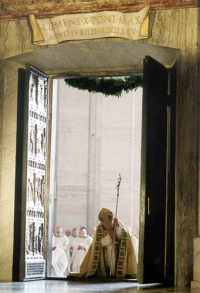 Pope John Paul II conquering this Jubilee for Christ JesusI believe in the mission of the new evangelization. This website represents my work and desire to see the Gospel of Jesus Christ rekindle the flame of faith in the "frozen chosen" scattered about in pews all across America. I have often reflected on what the new evangelization looks like. In this post I am not going for exhaustive analysis. What I want to do is toss out a brief sketch of what I think are 4 elements of the spirit of the new evangelization.
Pope John Paul II conquering this Jubilee for Christ JesusI believe in the mission of the new evangelization. This website represents my work and desire to see the Gospel of Jesus Christ rekindle the flame of faith in the "frozen chosen" scattered about in pews all across America. I have often reflected on what the new evangelization looks like. In this post I am not going for exhaustive analysis. What I want to do is toss out a brief sketch of what I think are 4 elements of the spirit of the new evangelization.
First, the new evangelization is about the "art of living" and of finding the path to happiness, which is Jesus. Cardinal Ratzinger in an address to catechists that he gave in the year 2000, taught that the new evangelization was necessary today because, in our joyless world, there is little room for God in the secularized and de-Christianized nations. In such a world that still yearns for happiness, the new way to preach the gospel must be provided that communicates this art of living.
